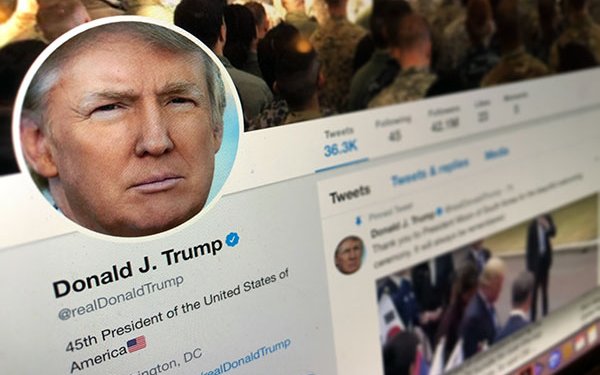
President Donald Trump violates the First Amendment by blocking critics on Twitter, a federal judge in New York ruled Wednesday.
"This case requires us to consider whether a public official
may, consistent with the First Amendment, 'block' a person from his Twitter account in response to the political views that person has expressed, and whether the analysis differs because that public
official is the President of the United States," U.S. District Court Judge Naomi Reice Buchwald said in a sweeping ruling on people's free speech rights in the digital age. "The answer to both
questions is no."
But she stopped short of ordering Trump and his social media director, Dan Scavino, to unblock people. Instead, she said in her ruling that she expected Trump and Scavino to
follow the law. "Because no government official is above the law and because all government officials are presumed to follow the law once the judiciary has said what the law is, we must assume that
the President and Scavino will remedy the blocking we have held to be unconstitutional," she wrote.
advertisement
advertisement
A Department of Justice spokesperson said: "We respectfully disagree with the
court’s decision and are considering our next steps."
The ruling came in a lawsuit filed last July by the Knight Institute and seven critics of the president who were blocked by
him. They argued that the @realDonaldTrump account is a "public forum" -- meaning that it is comparable to city streets, parks and other locales where the government can't prevent people from speaking
based on their views. The users asked Buchwald to declare the blocks unconstitutional, and to order Trump and other officials to remove the blocks.
The Department of Justice urged Buchwald to
reject the claims, arguing that Trump has a First Amendment right to decide who to interact with on Twitter. The DOJ also argued that the blocked Twitter users weren't injured, because they could
continue to read Trump's tweets and interact with other users.
But Buchwald said in her ruling that the blocks impermissibly limited people's ability to use Twitter. "As long as they remain
blocked, 'the Individual Plaintiffs cannot view the President’s tweets; directly reply to these tweets; or use the @realDonaldTrump webpage to view the comment threads associated with the
President’s tweets while they are logged in to their verified accounts,'" she wrote, quoting from a court document.
She added that it's also difficult for people to "understand the reply
tweets without the context of the original @realDonaldTrump tweets."
Buchwald also rejected the DOJ's argument that Trump has a First Amendment right to "block" individuals he doesn't wish to
engage with, noting that blocking people limits their rights to interact with other Twitter users.
"The blocking of the individual plaintiffs as a result of the political views they have
expressed is impermissible under the First Amendment," she wrote. "While we must recognize, and are sensitive to, the President’s personal First Amendment rights, he cannot exercise those rights
in a way that infringes the corresponding First Amendment rights of those who have criticized him."
Instead, she repeated a suggestion she made at a hearing in March -- that Trump avoid interacting with critics by "muting" them.
"Muting ... vindicates the President’s right to ignore certain speakers and to selectively amplify the voices of certain others but -- unlike blocking -- does so without restricting the right of
the ignored to speak," Buchwald wrote.